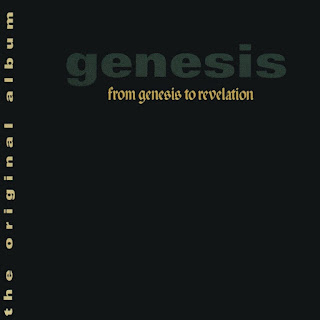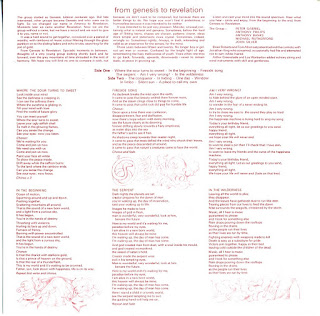From Genesis to Revelation is the first studio album by the British band Genesis. It was released in March 1969 on Decca Records in England (London Records in North America). It was produced by Jonathan King, who discovered them in 1967 while the members of Genesis were pupils at Charterhouse School, King's alma mater. It was reissued in various regions, including the United Kingdom (home country), as In the Beginning (first in 1974) and then part of Decca's Rock Roots repackaging series in 1976 before reverting to original title in recent reissues.
Genesis originally consisted of Peter Gabriel, Tony Banks, Mike Rutherford, and Anthony Phillips, without a drummer. Once one of their demo tapes caught the attention of Jonathan King, he took them under his wing, gave them the name Genesis and, with the addition of schoolmate Chris Stewart on drums, recorded "The Silent Sun" as their first single. It was later described by the band as a "Bee Gees pastiche" written specifically to win King's approval, as the Bee Gees were one of King's favourite groups. Its February 1968 release on Decca Records was not a commercial success; neither was the follow-up "A Winter's Tale" three months later, or the third single "Where the Sour Turns to Sweet".
After replacing Chris Stewart with John Silver, King wanted the band to make an album with songs loosely based on passages in the Bible in the form of a concept album, and in the music style of the Bee Gees. The album was recorded in August 1968 during school holidays, with King adding string accompaniments.
The band's name was omitted from the sleeve, because Decca had recently discovered that an obscure American act was also calling itself Genesis and asked the band to consider changing its name to avoid confusion, which King declined. The American "Genesis" in question was likely a Los Angeles-based group that released In the Beginning on the Mercury label in 1967.
By this time Jonathan King was losing interest in the band and they decided to record and perform on their own musical terms. Although King had more experience and was aiming to present Genesis in a marketable way, they were feeling more and more constrained by King's attempts to curtail and limit their increasingly lengthy and adventurous new compositions. The band went professional in the autumn of 1969, and after replacing John Silver with John Mayhew on drums, Genesis began formulating the music that would lead to Trespass the following year and were eventually signed to Charisma Records after an introduction by King to his friend Tony Stratton-Smith, a sports journalist managing bands in his spare time. Rutherford maintains that Genesis owes the producer a debt of gratitude:
Jonathan King, for all his faults – he has a funny reputation in England – did give us a fantastic opportunity. Because in those days, in England, you couldn't get in the studio. I mean, now a new group can very easily get a chance to go and record a single, just something, you know, to show there's something going for them. In those days, to get any sort of record contract, was really magical. And he gave us a chance to do a whole record. You've got a bunch of musicians who were really amateur, could barely play well, were barely a group, and were able to go in one summer holiday and make a record.
Although initially licensed to Decca Records, King holds the rights to the album and has re-released it several times under a variety of titles. The album was not included in the 2008 box set, Genesis 1970–1975, which covers the rest of the band's era with singer Peter Gabriel.
On 27 July 1990, the album was reissued in a two disc set. The second disc included the four tracks included on And the Word Was....., four early versions of songs on the album, and ten interviews.
On 25 October 2010, the album was released as a special edition on iTunes. It includes the bonus tracks from the 1990 reissue.
Noel Gallagher is a fan of the album, saying, "I became obsessed with early Genesis" despite being a frequent critic of the group's later work, particularly Phil Collins. The track "If Love is the Law" from his album Who Built the Moon? was written as a pastiche of "The Conqueror".






















No hay comentarios.:
Publicar un comentario